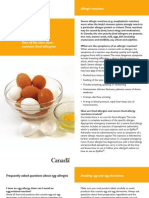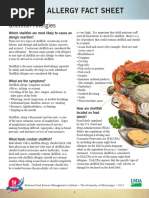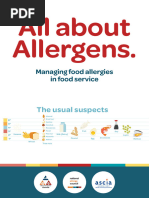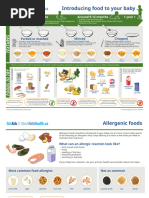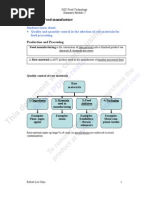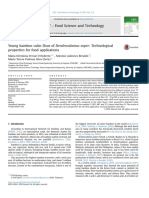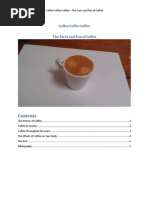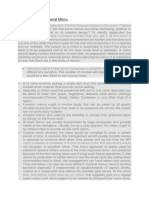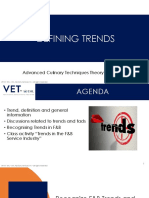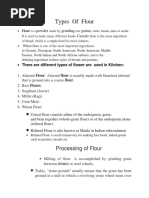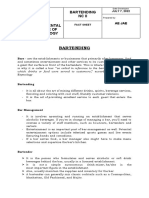Tree Nuts: One of The Nine Most Common Food Allergens
Tree Nuts: One of The Nine Most Common Food Allergens
Uploaded by
melissascheichl416Copyright:
Available Formats
Tree Nuts: One of The Nine Most Common Food Allergens
Tree Nuts: One of The Nine Most Common Food Allergens
Uploaded by
melissascheichl416Original Title
Copyright
Available Formats
Share this document
Did you find this document useful?
Is this content inappropriate?
Copyright:
Available Formats
Tree Nuts: One of The Nine Most Common Food Allergens
Tree Nuts: One of The Nine Most Common Food Allergens
Uploaded by
melissascheichl416Copyright:
Available Formats
Allergic reactions
Allergic reactions are severe adverse reactions that
occur when the body’s immune system overreacts to
Tree Nuts a particular allergen. These reactions may be caused
by food, insect stings, latex, medications and other
substances. In Canada, the nine priority food allergens
are peanuts, tree nuts, sesame seeds, milk, eggs,
seafood (fish, crustaceans and shellfish), soy, wheat
One of the nine most and sulphites (a food additive).
common food allergens
What are the symptoms of an allergic reaction?
When someone comes in contact with an allergen, the
symptoms of a reaction may develop quickly and rapidly
progress from mild to severe. The most severe form of an
allergic reaction is called anaphylaxis. Symptoms can include
breathing difficulties, a drop in blood pressure or shock,
which may result in loss of consciousness and even death.
A person experiencing an allergic reaction may have any
of the following symptoms:
• Flushed face, hives or a rash, red and itchy skin
• Swelling of the eyes, face, lips, throat and tongue
• Trouble breathing, speaking or swallowing
• Anxiety, distress, faintness, paleness, sense of doom,
weakness
• Cramps, diarrhea, vomiting
• A drop in blood pressure, rapid heart beat,
loss of consciousness
How are food allergies and severe allergic
reactions treated?
Currently there is no cure for food allergies. The only
option is complete avoidance of the specific allergen.
Appropriate emergency treatment for anaphylaxis (a severe
food allergy reaction) includes an injection of adrenaline,
which is available in an auto-injector device. Adrenaline
must be administered as soon as symptoms of a severe
allergic reaction appear. The injection must be followed by
further treatment and observation in a hospital emergency
room. If your allergist has diagnosed you with a food allergy
and prescribed adrenaline, carry it with you all the time and
know how to use it. Follow your allergist’s advice on how
to use an auto-injector device.
Frequently asked questions about Avoiding tree nuts and tree nut derivatives
tree nut allergies
Which tree nuts are included in Canada’s list Make sure you read product labels carefully to avoid
of priority food allergens? products that contain tree nuts and tree nut derivatives.
The tree nuts of concern are almonds, Brazil nuts, cashews, Avoid food and products that do not have an ingredient
hazelnuts (filberts), macadamia nuts, pecans, pine nuts list and read labels every time you shop. Manufacturers
(pignolias), pistachio nuts and walnuts. Peanuts are part may occasionally change their recipes or use different
of the legume family and are not considered a tree nut. ingredients for varieties of the same brand. Refer to the
following list before shopping:
I have a tree nut allergy. How can I avoid a
tree nut-related reaction?
Avoid all food and products that contain tree nuts and tree Other names for tree nuts
nut derivatives. These include any product whose ingredient Anacardium nuts
list warns it “may contain” or “may contain traces of” Calisson (a marzipan-like candy made from almonds)
tree nuts. Marzipan (almond paste)
Nut meats
Should I avoid coconut and nutmeg if I have a tree Pinon
nut allergy? Queensland nut (macadamia)
A coconut is a seed of a fruit and nutmeg is obtained from
the seeds of a tropical tree. Therefore, they are not usually
restricted from the diet of someone allergic to tree nuts.
However, some people have reacted to coconut and
nutmeg. Consult your allergist before trying coconut or
nutmeg products.
How can I determine if a product contains tree nuts
or tree nut derivatives?
Always read the ingredient list carefully. Tree nuts and tree
nut derivatives can often be present under different names,
e.g., marzipan. For other common ingredient label names,
refer to the list below.
What do I do if I am not sure whether a product
contains tree nuts or tree nut derivatives?
If you have a tree nut allergy, do not eat or use the product.
Get ingredient information from the manufacturer.
Does product size affect the likelihood of an
allergic reaction?
It does not affect the likelihood of a reaction; however,
the same brand of product may be safe to consume for
one product size but not another.This is because product
formulation may vary between different product sizes of
the same product.
Possible sources of tree nuts What can I do?
Baked goods, e.g., cakes, cereal bars, cookies, doughnuts,
energy/granola bars, muffins, pastries Be informed
Baking mixes, cereals, crackers, muesli See an allergist and educate yourself about food allergies.
Dressings, gravies Contact your local allergy association for further information.
Gianduja, e.g., chocolate and chopped nuts mixture found
in premium or imported chocolate and ice cream If you or anyone you know has food allergies or would
Ice cream, frozen desserts, frozen yogurts, sundae toppings, like to receive information about food being recalled, sign
pralines up for the Canadian Food Inspection Agency’s (CFIA) free
Main course dishes, e.g., almond chicken,Asian food such e-mail “Food Recalls and Allergy Alerts” notification service
as pad thai and satay, chili, trout amandine available at www.inspection.gc.ca/english/tools/
Natural flavourings and extracts, e.g., pure almond extract listserv/listsube.shtml?foodrecalls_rappelsaliments.
Nut butter, nut/peanut oil When you sign up you will automatically receive food recall
Nut-flavoured coffee/liqueurs, e.g., amaretto, Frangelico® public warnings.
Salads, e.g.,Waldorf salad
Sauces, e.g., barbeque, pesto Before eating
Snack foods, e.g., candy, chips, chocolate, popcorn, Allergists recommend that if you do not have your
snack/trail mixes auto-injector device with you, that you do not eat. If
Spreads, e.g., almond paste, cheese, chocolate nut, nougat, an ingredient list says a product “may contain” or “does
Nutella®, nut paste contain” tree nut or tree nut derivatives, do not eat it.
Vegetarian dishes If you do not recognize an ingredient or there is no
ingredient list available, avoid the product.
Non-food sources of tree nuts
Bean bags, kick sacks/hacky sacks
Bird seed
Cosmetics, hair care products, sun screens Watch out for allergen cross contamination!
Massage oils
Pet food Cross contamination is the transfer of an ingredient (food
allergen) to a product that does not normally have that
ingredient in it. Through cross contamination, a food that
Note: These lists are not complete and may change. Food should not contain the allergen could become dangerous
and food products purchased from other countries, through to eat for those who are allergic.
mail-order or the Internet, are not always produced using the
same manufacturing and labelling standards as in Canada. Cross contamination can happen:
• during food manufacturing through shared production
and packaging equipment;
• at retail through shared equipment, e.g., cheese and deli
meats sliced on the same slicer; and through bulk display
of food products, e.g., bins of baked goods, bulk nuts; and
• during food preparation at home or in restaurants
through equipment, utensils and hands.
What is the Government of Canada doing Where can I get more information?
about food allergens?
The Government of Canada is committed to providing safe For more information on:
food to all Canadians. The CFIA and Health Canada work • food allergies;
closely with municipal, provincial and territorial partners • ordering free copies of this pamphlet; and
and industry to meet this goal. • subscribing to the free “Food Recalls and Allergy Alerts”
e-mail notification service,
The CFIA enforces Canada’s labelling laws and works with visit the CFIA Website at www.inspection.gc.ca
associations, distributors, food manufacturers and importers or call 1 800 442-2342/TTY 1 800 465-7735
to ensure complete and appropriate labelling of all foods. (8:00 a.m. to 8:00 p.m. Eastern time, Monday to Friday).
The CFIA recommends that food companies establish
effective allergen controls to prevent the occurrence of
undeclared allergens and cross-contamination. The CFIA has Below are some organizations that can provide additional
developed guidelines and tools to aid them in developing allergy information:
these controls. When the CFIA becomes aware of a
potential serious hazard associated with a food, such as Allergy/Asthma Information Association www.aaia.ca
undeclared allergens, the food product is recalled from the Anaphylaxis Canada www.anaphylaxis.ca
marketplace and a public warning is issued. The CFIA has Association québécoise des allergies alimentaires
also published several advisories to industry and consumers www.aqaa.qc.ca (French only)
regarding allergens in food. Canadian Society of Allergy and Clinical Immunology
www.csaci.medical.org (English only)
Health Canada has worked with the medical community, Health Canada www.hc-sc.gc.ca
consumer associations, and the food industry to enhance
labelling regulations for priority allergens, gluten sources
and sulphites in pre-packaged food sold in Canada. Health Developed in consultation with Allergy/Asthma Information
Canada is proposing to amend the Food and Drug Regulations Association, Anaphylaxis Canada, Association québécoise des
to require that the most common food and food ingredients allergies alimentaires, Canadian Society of Allergy and Clinical
that cause life-threatening or severe allergic reactions Immunology and Health Canada.
are always identified by their common names allowing
consumers to easily recognize them.
Cat. No. A104-27/7-2005E
ISBN 0-662-40356-8
P0423-05/07E
You might also like
- White Paper Online Version Clean Label YoghurtDocument21 pagesWhite Paper Online Version Clean Label YoghurtHoàng Nguyễn VănNo ratings yet
- Ethical Issuesin Menu PlanningDocument103 pagesEthical Issuesin Menu PlanningJoderick Tejada50% (4)
- Sensory Analysis of Chocolate LiquorDocument14 pagesSensory Analysis of Chocolate LiquorOscarERocandioSNo ratings yet
- AAA FoodAllergenCards A4 EGGDocument2 pagesAAA FoodAllergenCards A4 EGGdibyen89No ratings yet
- AAA FoodAllergenCards A4 MEATDocument2 pagesAAA FoodAllergenCards A4 MEATdibyen89No ratings yet
- Food Allergens EcolabDocument34 pagesFood Allergens EcolabbrurNo ratings yet
- AAA FoodAllergenCards A4 LUPINDocument2 pagesAAA FoodAllergenCards A4 LUPINdibyen89No ratings yet
- AAA FoodAllergenCards A4 PEANUTDocument2 pagesAAA FoodAllergenCards A4 PEANUTdibyen89No ratings yet
- Food AllergyDocument12 pagesFood Allergyrai100% (1)
- Allergen Sulphites Sulfites EngDocument4 pagesAllergen Sulphites Sulfites Engmelissascheichl416No ratings yet
- Egg Allergy - Alternate Names For Egg Ingredients in Food Ingredient ListsDocument4 pagesEgg Allergy - Alternate Names For Egg Ingredients in Food Ingredient Listsmelissascheichl416No ratings yet
- Food Allergen FundamentalsDocument38 pagesFood Allergen FundamentalsAdeola FataiNo ratings yet
- Soy AllergyDocument4 pagesSoy Allergymelissascheichl416No ratings yet
- Seafood/Fish AllergyDocument4 pagesSeafood/Fish Allergymelissascheichl416No ratings yet
- The Allergy Substitution Handbook: Tolerable Substitutes for Food IntoleranceFrom EverandThe Allergy Substitution Handbook: Tolerable Substitutes for Food IntoleranceNo ratings yet
- Shellfish Fact SheetDocument5 pagesShellfish Fact SheetDr Sneha's Skin and Allergy Clinic IndiaNo ratings yet
- NAC AAA Booklet April 28Document19 pagesNAC AAA Booklet April 28garry.scrivens1ntlworld.comNo ratings yet
- Food Allergy 1Document2 pagesFood Allergy 1PrafullyaNo ratings yet
- AAA FoodAllergenCards A4 FISHDocument2 pagesAAA FoodAllergenCards A4 FISHdibyen89No ratings yet
- Fish Allergies Fact SheetDocument4 pagesFish Allergies Fact SheetJeremia KevinNo ratings yet
- Food Intolerances and Allergies: © Livestock & Meat Commission For Northern Ireland 2015Document19 pagesFood Intolerances and Allergies: © Livestock & Meat Commission For Northern Ireland 2015soniaditia_chemistNo ratings yet
- Group 3Document29 pagesGroup 3Zeshan SaleemNo ratings yet
- Food Production Operation by Souren ChoudhuryDocument113 pagesFood Production Operation by Souren ChoudhuryAnonymous wTlfoxCDhNo ratings yet
- Introducing - Food - To - Baby - and - Allergy - Foods AllergyDocument2 pagesIntroducing - Food - To - Baby - and - Allergy - Foods AllergyVirdha PermathaNo ratings yet
- (Life - Culture) IkigaiDocument3 pages(Life - Culture) IkigaiNew ManNo ratings yet
- Allergen AwarenessDocument1 pageAllergen Awarenesssoniaditia_chemistNo ratings yet
- ErythritolDocument3 pagesErythritolyuni fadilahNo ratings yet
- TG Prepare Choc & Produce Choc Products FN 060214Document62 pagesTG Prepare Choc & Produce Choc Products FN 060214YohanesArifNo ratings yet
- Dairy, Eggs, and Dry GoodsDocument33 pagesDairy, Eggs, and Dry GoodsSenthil KumarNo ratings yet
- CocktailsDocument12 pagesCocktailsKamlesh K JhaNo ratings yet
- Course Syllabus - Cooking Theory Sept09Document20 pagesCourse Syllabus - Cooking Theory Sept09jermsemail0204No ratings yet
- All About Allergens Brochure FA PDFDocument9 pagesAll About Allergens Brochure FA PDFМиша МакухNo ratings yet
- AllergySafefood 20food 20allergy 20and 20intolerance 20catering 20guideDocument30 pagesAllergySafefood 20food 20allergy 20and 20intolerance 20catering 20guideEclatNo ratings yet
- UNIT 5 - The MenuDocument7 pagesUNIT 5 - The MenuRHTi BDNo ratings yet
- TouchBistros Restaurant Business Plan TemplateDocument15 pagesTouchBistros Restaurant Business Plan TemplateMarie Claudine TUBANENEZANo ratings yet
- Fat 041649Document17 pagesFat 041649sudiptasethy0No ratings yet
- Food Safety-Salmonella: RaiseDocument2 pagesFood Safety-Salmonella: RaiseFitriani Diniyah100% (1)
- Food Allergy in ChildrenDocument17 pagesFood Allergy in ChildrenvyasakandarpNo ratings yet
- Allergo-Immunology Hour: Food AllergyDocument32 pagesAllergo-Immunology Hour: Food AllergyJill PNo ratings yet
- Core Hospitality Prelim NotesDocument29 pagesCore Hospitality Prelim NotesSoph RocheNo ratings yet
- The Relation Between Menu Planning and Purchasing, Personnel and EquipmentDocument15 pagesThe Relation Between Menu Planning and Purchasing, Personnel and Equipmentaden ibnuNo ratings yet
- Unit 1 - Use Hygienic Practices For Food SafetyDocument30 pagesUnit 1 - Use Hygienic Practices For Food Safetyapi-505030460No ratings yet
- Dietary Guidelines and Food GuideDocument5 pagesDietary Guidelines and Food GuideDanica Mae BianitoNo ratings yet
- Unit 5 Chapter 15 - Cooking TechniquesDocument26 pagesUnit 5 Chapter 15 - Cooking Techniquesryukenfawwaz12345100% (1)
- Module 2 - Food ManufactureDocument33 pagesModule 2 - Food Manufacturerbtlch1n82% (11)
- Young Bamboo Culm FlourDocument6 pagesYoung Bamboo Culm FlourBoodjieh So ImbaNo ratings yet
- Basic Cooking: Preparation and Cooking FoodDocument6 pagesBasic Cooking: Preparation and Cooking Foodkevin mendozaNo ratings yet
- Coffee Coffee CoffeeDocument5 pagesCoffee Coffee CoffeeBrad SaltNo ratings yet
- A Guide To Carbonating Beverages at Small ScaleDocument5 pagesA Guide To Carbonating Beverages at Small ScaledanNo ratings yet
- Nutra Cue Tical SDocument9 pagesNutra Cue Tical Sakshay panjabiNo ratings yet
- Food Allergy Is Very ImportantDocument8 pagesFood Allergy Is Very Importanthossamali7272No ratings yet
- Kitchen Tools and EquipmentDocument136 pagesKitchen Tools and EquipmentBianca Margarette CabelNo ratings yet
- Training AssignmentDocument5 pagesTraining AssignmentAjith NAIRNo ratings yet
- Chinese TeaDocument11 pagesChinese TeaMesba HoqueNo ratings yet
- Artificial Sweeteners Aspartame, SaccharinDocument18 pagesArtificial Sweeteners Aspartame, SaccharinkhnumdumandfullofcumNo ratings yet
- Defining Trends: Advanced Culinary Techniques Theory - Advanced CourseDocument11 pagesDefining Trends: Advanced Culinary Techniques Theory - Advanced CourseZoran StojanovicNo ratings yet
- Menu PlanningDocument12 pagesMenu PlanningAman KeltaNo ratings yet
- Types of FlourDocument8 pagesTypes of Floursanidhi prasadNo ratings yet
- BARTENDING Fact Sheet 1Document17 pagesBARTENDING Fact Sheet 1Sittie DicayanNo ratings yet










